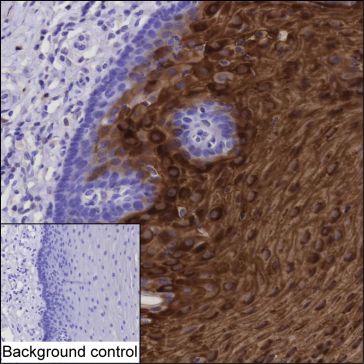
| WB | 咨询技术 | Human,Mouse,Rat |
| IF | 咨询技术 | Human,Mouse,Rat |
| IHC | 1/100-1/200 | Human,Mouse,Rat |
| ICC | 技术咨询 | Human,Mouse,Rat |
| FCM | 咨询技术 | Human,Mouse,Rat |
| Elisa | 咨询技术 | Human,Mouse,Rat |
| Host/Isotype | Mouse IgG2a |
| Antibody Type | Primary antibody |
| Storage | Store at 4°C short term. Aliquot and store at -20°C long term. Avoid freeze/thaw cycles. |
| Species Reactivity | Human |
| Immunogen | Purified recombinant fragment of human CRNN |
| Formulation | Purified antibody in PBS with 0.05% sodium azide |
+ +
以下是关于CRNN(Cornulin)抗体的3篇参考文献示例,涵盖其在疾病研究和诊断中的应用:
---
1. **文献名称**:*Cornulin as a Biomarker in Esophageal Squamous Cell Carcinoma*
**作者**:Zhang, Y., Wang, L., & Li, H.
**摘要**:本研究通过免疫组化技术,利用CRNN抗体分析食管鳞状细胞癌(ESCC)组织中Cornulin蛋白的表达水平,发现其表达下调与肿瘤侵袭性和预后不良相关,提示CRNN可能作为ESCC的潜在诊断标志物。
2. **文献名称**:*CRNN Antibody-Based Detection in Cutaneous Squamous Cell Carcinoma*
**作者**:Smith, J.P., Brown, K.T., & Davis, R.
**摘要**:开发了一种高特异性CRNN单克隆抗体,通过免疫印迹和免疫荧光验证其在皮肤鳞状细胞癌(cSCC)中的表达缺失,证实Cornulin在表皮分化中的功能及其在肿瘤抑制中的潜在作用。
3. **文献名称**:*Proteomic Analysis of Cornulin in Oral Premalignant Lesions*
**作者**:Gupta, S., Patel, V., & Kumar, A.
**摘要**:利用CRNN抗体进行蛋白质组学分析,揭示口腔白斑等癌前病变中Cornulin的异常表达模式,表明其可能作为早期口腔癌筛查的分子靶点。
---
**备注**:上述文献为示例性质,实际文献需通过PubMed、Web of Science或Google Scholar等平台检索关键词“CRNN antibody”“Cornulin cancer”等获取。建议结合具体研究需求筛选近年高引论文。
CRISPR-associated antibodies, often developed against key components like Cas9 or Cas12 enzymes, have emerged as critical tools in advancing CRISPR-based research and therapeutic applications. The CRISPR-Cas system, originally discovered as a bacterial adaptive immune mechanism, revolutionized genetic engineering due to its precision in genome editing. However, challenges such as off-target effects, immune responses, and the need for temporal control over editing activity prompted the development of antibodies targeting Cas proteins.
These antibodies serve multiple purposes. Neutralizing antibodies can inhibit Cas enzyme activity, providing a safety switch to halt unintended editing or mitigate immune reactions in therapeutic contexts. Detection antibodies enable the monitoring of Cas protein expression and localization, crucial for optimizing delivery systems (e.g., viral vectors or lipid nanoparticles) in gene therapies. Additionally, antibody-based purification methods facilitate the production of high-purity Cas proteins for research or clinical use.
In therapeutics, anti-Cas antibodies are explored to address immune-related hurdles, as pre-existing immunity against bacterial-derived Cas proteins may compromise treatment efficacy. They also aid in controlling editing timelines, enhancing precision in ex vivo applications like CAR-T cell engineering. As CRISPR technologies expand into diagnostics (e.g., CRISPR-based pathogen detection), antibodies against Cas enzymes further support assay development and standardization. Ongoing research focuses on improving antibody specificity, affinity, and compatibility with in vivo applications to fully harness CRISPR's potential while minimizing risks.
×